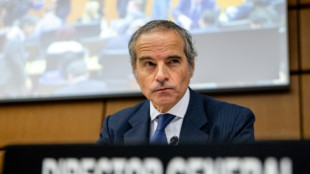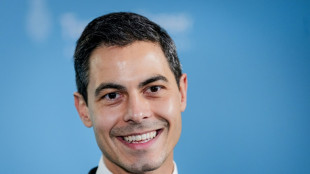
-
 Fela Kuti: first African to get Grammys Lifetime Achievement Award
Fela Kuti: first African to get Grammys Lifetime Achievement Award
-
'Schitt's Creek' star Catherine O'Hara dead at 71

-
 Curran hat-trick seals 11 run DLS win for England over Sri Lanka
Curran hat-trick seals 11 run DLS win for England over Sri Lanka
-
Cubans queue for fuel as Trump issues energy ultimatum

-
 France rescues over 6,000 UK-bound Channel migrants in 2025
France rescues over 6,000 UK-bound Channel migrants in 2025
-
Surprise appointment Riera named Frankfurt coach

-
 Maersk to take over Panama Canal port operations from HK firm
Maersk to take over Panama Canal port operations from HK firm
-
US arrests prominent journalist after Minneapolis protest coverage

-
 Analysts say Kevin Warsh a safe choice for US Fed chair
Analysts say Kevin Warsh a safe choice for US Fed chair
-
Trump predicts Iran will seek deal to avoid US strikes

-
 US oil giants say it's early days on potential Venezuela boom
US oil giants say it's early days on potential Venezuela boom
-
Fela Kuti to be first African to get Grammys Lifetime Achievement Award

-
 Trump says Iran wants deal, US 'armada' larger than in Venezuela raid
Trump says Iran wants deal, US 'armada' larger than in Venezuela raid
-
US Justice Dept releases new batch of documents, images, videos from Epstein files

-
 Four memorable showdowns between Alcaraz and Djokovic
Four memorable showdowns between Alcaraz and Djokovic
-
Russian figure skating prodigy Valieva set for comeback -- but not at Olympics

-
 Barcelona midfielder Lopez agrees contract extension
Barcelona midfielder Lopez agrees contract extension
-
Djokovic says 'keep writing me off' after beating Sinner in late-nighter

-
 US Justice Dept releasing new batch of Epstein files
US Justice Dept releasing new batch of Epstein files
-
South Africa and Israel expel envoys in deepening feud

-
 French eyewear maker in spotlight after presidential showing
French eyewear maker in spotlight after presidential showing
-
Olympic dream 'not over', Vonn says after crash

-
 Brazil's Lula discharged after cataract surgery
Brazil's Lula discharged after cataract surgery
-
US Senate races to limit shutdown fallout as Trump-backed deal stalls

-
 'He probably would've survived': Iran targeting hospitals in crackdown
'He probably would've survived': Iran targeting hospitals in crackdown
-
Djokovic stuns Sinner to set up Australian Open final with Alcaraz

-
 Mateta omitted from Palace squad to face Forest
Mateta omitted from Palace squad to face Forest
-
Djokovic 'pushed to the limit' in stunning late-night Sinner upset

-
 Tunisia's famed blue-and-white village threatened after record rains
Tunisia's famed blue-and-white village threatened after record rains
-
Top EU official voices 'shock' at Minneapolis violence

-
 Kremlin says agreed to halt strikes on Kyiv until Sunday
Kremlin says agreed to halt strikes on Kyiv until Sunday
-
Carrick calls for calm after flying start to Man Utd reign

-
 Djokovic to meet Alcaraz in Melbourne final after five-set marathon
Djokovic to meet Alcaraz in Melbourne final after five-set marathon
-
Italian officials to testify in trial over deadly migrant shipwreck

-
 Iran says defence capabilities 'never' up for negotiation
Iran says defence capabilities 'never' up for negotiation
-
UN appeals for more support for flood-hit Mozambicans

-
 Lijnders urges Man City to pile pressure on Arsenal in title race
Lijnders urges Man City to pile pressure on Arsenal in title race
-
Fulham sign Man City winger Oscar Bobb

-
 Strasbourg's Argentine striker Panichelli sets sights on PSG, World Cup
Strasbourg's Argentine striker Panichelli sets sights on PSG, World Cup
-
Jesus 'made love': Colombian president irks Christians with steamy claim

-
 IAEA board meets over Ukraine nuclear safety concerns
IAEA board meets over Ukraine nuclear safety concerns
-
Eurozone growth beats 2025 forecasts despite Trump woes

-
 Dutch PM-elect Jetten says not yet time to talk to Putin
Dutch PM-elect Jetten says not yet time to talk to Putin
-
Social media fuels surge in UK men seeking testosterone jabs

-
 Forest face Fenerbahce, Celtic draw Stuttgart in Europa League play-offs
Forest face Fenerbahce, Celtic draw Stuttgart in Europa League play-offs
-
US speed queen Vonn crashes at Crans-Montana, one week before Olympics

-
 Trump nominates former US Fed official as next central bank chief
Trump nominates former US Fed official as next central bank chief
-
New Dutch government pledges ongoing Ukraine support

-
 Newcastle still coping with fallout from Isak exit, says Howe
Newcastle still coping with fallout from Isak exit, says Howe
-
Chad, France eye economic cooperation as they reset strained ties


Top climate fundraiser offers defense of disruptive protests
For years, Margaret Klein Salamon labored behind the scenes to try to convince politicians about the existential threat posed by climate change.
Today, she has changed her approach: the American activist is in charge of a fund that exclusively finances groups engaging in civil disobedience.
It's the "most effective way to change policy fast, and public opinion," the 37-year-old New Yorker told AFP during an interview in her Brooklyn neighborhood.
Salamon is the executive director of the Climate Emergency Fund, which was founded in 2019 by the filmmaker Rory Kennedy -- niece of the late president -- and Getty family heiress Aileen Getty.
Its board of directors includes Adam McKay, director of the satirical film about climate, "Don't Look Up," who is also the biggest donor.
In 2022, the fund distributed $5 million to groups such as Just Stop Oil, Extinction Rebellion, Scientist Rebellion, and more.
These are the groups behind some of the most eye-catching recent climate protests: gluing their hands to roads or airport runways, disrupting sports events or throwing soup or paint at works of art protected by glass.
Such actions have drawn anger and accusations of harming the wider cause.
But Salamon, author of "Facing the Climate Emergency," stands by the headline-grabbing protests.
"Social science and history both are very clear, that disruptive activism is the fastest way to create transformative change," says the Harvard graduate.
"Which tactics of the civil rights movement or the suffragettes or the AIDS movement went too far?" she argues, provocatively.
For her, the arguments against just don't hold water. "I would like to actually hear from someone who says, 'I used to care about climate change, but now that these protesters have used these tactics, I no longer do.'"
- 'Emergency mode' -
The goal, she says, is to make the issue as visible as possible, so that it is present in the minds of voters. And to broaden a sense of "climate emergency," that she believes is "contagious."
"Humans evaluate risk socially, not rationally," explains the trained psychologist, who made a complete career shift shortly after witnessing the devastation caused by Hurricane Sandy in New York City in 2012.
For example if a fire alarm goes off in an office, people take their cues from others and generally stay calm and assume it's a drill, unless told emphatically otherwise, particularly by someone in leadership.
Such mass awareness can happen "pretty quickly," she argues, and trigger a shift into "emergency mode."
That's what it'll take for a massive mobilization of resources she believes, like what happened during the Second World War or during the Covid pandemic.
Activists want to break the "mass delusion of normalcy" among those members of the public that remain passive and disengaged.
They're also targeting the decision-makers themselves, with very concrete results, she argues.
Joe Manchin, a US senator whose vote was key to passing Joe Biden's signature climate law, was followed by protesters for months, blocking his car, his boat, and more. The fund spent around $200,000 to support them.
Salamon is under no illusion that the protests alone were enough to sway the West Virginia lawmaker. But even if they were "two percent of the reason," for passage of the Inflation Reduction Act, which comes with $370 billion in climate investments, "just think about that return on investment."
- 'Not a popularity contest' -
While there has been a large influx of money into the climate space, not enough has been directed towards activism, warns Salamon.
What she calls the "reformist gradualist movement," that works "within the system" and is embodied by groups like Greenpeace, has been the dominant force for decades.
But for new groups, she quickly became aware of the significance of fundraising -- "a very unpopular" role, in her words, but one in which she found herself to be highly effective.
Ironically, she's not personally drawn to protests. Having never been arrested, she says she has nothing but admiration for the "incredibly brave" demonstrators on the ground, some of whom have gone to prison.
She condemns growing repression by governments towards climate dissidents, stressing that the groups supported by the Climate Emergency Fund are committed to being nonviolent.
But she's not worried if public sentiment isn't always in favor. "It's not a popularity contest," she says.
"We're sleepwalking off of a cliff -- and the activists are shaking us, trying to wake us up," she says. No one likes being shaken, but inaction will lead to a far worse outcome.
G.Schulte--BTB




